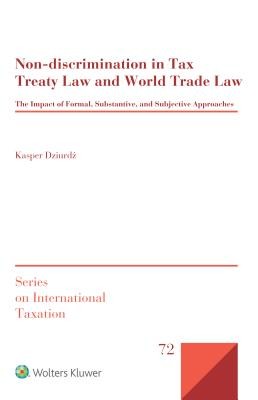
- Išsiųsime per 10–14 d.d.
- Autorius: Kasper Dziurdź
- Leidėjas: Kluwer Law International
- ISBN-10: 940350904X
- ISBN-13: 9789403509044
- Formatas: 15.8 x 24.9 x 4.1 cm, kieti viršeliai
- Kalba: Anglų
- Extra -15 % nuolaida šiai knygai su kodu: ENG15
Non-discrimination in Tax Treaty Law and World Trade Law + nemokamas atvežimas! | knygos.lt
Atsiliepimai
Aprašymas
Non-discrimination is a central obligation under both tax treaty and trade law. However, in seeking to strike a balance between national and international interests, its application differs in the two areas of practice. This deeply researched and authoritative work, which explains the policy issues and how non-discrimination analysis works, provides a comprehensive review of non-discrimination rules in WTO and tax treaty law, combining a critical commentary on case law with proposals for an innovative concept for solving cases of discrimination in tax treaty law.
Among the practical issues affecting non-discrimination examined in detail are the following:
- implications that can be drawn from the concepts of non-discrimination under WTO law and Article 24 of the OECD Model;
- direct and indirect discrimination and analysis of comparability in WTO law and tax treaty law;
- the MFN and NT rules under the GATT and GATS;
- the meaning of 'likeness' and 'less favourable treatment';
- claiming non-discriminatory tax treatment before tax administrations and courts under a tax treaty;
- justification of measures against harmful tax competition, low taxation and hybrid mismatch arrangements;
- thin capitalisation rules, progressive tax rates, foreign losses, group taxation and relief from juridical and economic double taxation under Article 24 of the OECD Model; and
- integrating a justification defence into any stage of a non-discrimination analysis.
The author establishes to what extent formal, substantive and subjective approaches may be applied in a non-discrimination analysis, providing the reasons for the approaches taken. A two-step comparability procedure is applied to selected cases of potential tax discrimination, demonstrating how policy arguments can be addressed under Article 24 of the OECD Model.
Drawing on over a half-century of case law in both areas of practice, this comprehensive study of the non-discrimination rules under WTO law and international tax law will be invaluable in systematically solving cases of tax discrimination under Article 24 of the OECD Model and putting forward arguments at any stage of a WTO analysis. Policymakers will benefit from the author's clear explanation of how national law should comply with international obligations. Also, taxpayers' advisers will proceed confidently in claims of tax treaty discrimination, and academics will discover an incomparable overview and analysis of anti-discrimination rules in international trade law and double taxation conventions.
EXTRA 15 % nuolaida
Kupono kodas: ENG15
Akcija baigiasi už 4d.21:46:17
Nuolaidos kodas galioja perkant nuo 10 €. Nuolaidos nesumuojamos.

- Autorius: Kasper Dziurdź
- Leidėjas: Kluwer Law International
- ISBN-10: 940350904X
- ISBN-13: 9789403509044
- Formatas: 15.8 x 24.9 x 4.1 cm, kieti viršeliai
- Kalba: Anglų
Non-discrimination is a central obligation under both tax treaty and trade law. However, in seeking to strike a balance between national and international interests, its application differs in the two areas of practice. This deeply researched and authoritative work, which explains the policy issues and how non-discrimination analysis works, provides a comprehensive review of non-discrimination rules in WTO and tax treaty law, combining a critical commentary on case law with proposals for an innovative concept for solving cases of discrimination in tax treaty law.
Among the practical issues affecting non-discrimination examined in detail are the following:
- implications that can be drawn from the concepts of non-discrimination under WTO law and Article 24 of the OECD Model;
- direct and indirect discrimination and analysis of comparability in WTO law and tax treaty law;
- the MFN and NT rules under the GATT and GATS;
- the meaning of 'likeness' and 'less favourable treatment';
- claiming non-discriminatory tax treatment before tax administrations and courts under a tax treaty;
- justification of measures against harmful tax competition, low taxation and hybrid mismatch arrangements;
- thin capitalisation rules, progressive tax rates, foreign losses, group taxation and relief from juridical and economic double taxation under Article 24 of the OECD Model; and
- integrating a justification defence into any stage of a non-discrimination analysis.
The author establishes to what extent formal, substantive and subjective approaches may be applied in a non-discrimination analysis, providing the reasons for the approaches taken. A two-step comparability procedure is applied to selected cases of potential tax discrimination, demonstrating how policy arguments can be addressed under Article 24 of the OECD Model.
Drawing on over a half-century of case law in both areas of practice, this comprehensive study of the non-discrimination rules under WTO law and international tax law will be invaluable in systematically solving cases of tax discrimination under Article 24 of the OECD Model and putting forward arguments at any stage of a WTO analysis. Policymakers will benefit from the author's clear explanation of how national law should comply with international obligations. Also, taxpayers' advisers will proceed confidently in claims of tax treaty discrimination, and academics will discover an incomparable overview and analysis of anti-discrimination rules in international trade law and double taxation conventions.




Atsiliepimai